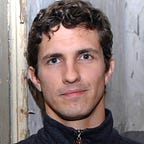About Developer Camp
Square, Getaround, Temple Run, OAuth, Apple’s TestFlight, Oracle’s Pushio — each of these have foundations at Developer Camp. Here you will learn how they came together, the patterns of their success, and how to follow the same path yourself.
Developer Camp is a combination of community support, cooperation, and an idea contest that lasts 48 hours from opening doors to closing ceremony. This should serve as a means to further understand how we produce these events, and how you might use this model to hold one of your own.
Of course, holding one event is just the beginning of building a community. Throughout the year, we also message our attendees, raise awareness amongst sponsors and partners, and regularly meet with high-profile contributors such as the winners of our contest.
Developer Camp is a concept that fused from several distinct, previously-existing event models. The first was BarCamp, a participant-driven “unconference” in which the content of presentations is decided by the attendees, presented by them, and organized entirely on the spot. Our camp incorporates this aspect by including the opportunity for attendees to hold “side sessions” or working groups that educate and inform.
Our event recalls the old User Group meetings of the late 1900s. These are the progeny of HomeBrew Computer Club, which spawned Apple, Inc and others. Following HomeBrew were meetings of the first “super users” of computers: the programmers, designers, and so-called early adopters of technology. Many of our founding members attended these Mac User Group meetings, or even organized them.
The second model that influenced the design of our camp is called SuperHappyDevHouse. This is a group that provides working space and community for developers (aka “nerds” in the loving sense of the word) to get busy and help each other. Since the times of SuperHappyDevHouse, a similar model has emerged across the country in the form of “co-working spaces.” The intention behind SuperHappyDevHouse was to build something a little more tightly knit and, well, happy.
Co-working spaces are full of people working on their own projects, sharing common resources like a kitchen, storage, networking, and the like. A “DevHouse” is something more communal, where people actively support each other’s projects, even sharing code and other precious resources. The idea of SuperHappyDevHouse was to make a great place for people to trust each other.
The third event model that influenced our developer camp was something called MacHack. This is an idea contest designed to entertain talented developers, each trying to outdo the other in terms of skill or in some cases absurdity. The overriding theme was to do something no one has ever done before, even to the point of complete obscurity. In fact, the legendary grand prize for MacHack used to go to the Most Useless hack.
Our Grand Prize today goes the Most Helpful participant or group, as judged by the participants themselves. We use a ticketing system to give helpers credit for their work, and the most tickets can win prizes valued in five digits.
What ties all of these concepts together is the belief that sharing ideas and code is the best way forward as a technology community. Contribution to Open Source, and a “we-can-do-it” attitude are at the heart of our Developer Camp. This has been at the core of our success as an annual event, and we are proud of the group’s ongoing commitment to projects like Oauth, iUI, Rails, and open standards such as PDF.
By participating in this event, you are guaranteed a minimum of the following:
- Idea Audit — come away with a peer-reviewed constructive critique of your dream.
- Self Development — gain new skills needed to make your idea come to life.
- New Connections — meet specialists with complimentary skills and experience.
The kind of positive peer pressure you’ll find during this event is unlike any other. Bring a friend, a colleague, or a relative; find a mentor, a co-founder, or a partner.
This model works to promote diversity and equality in the tech community.
